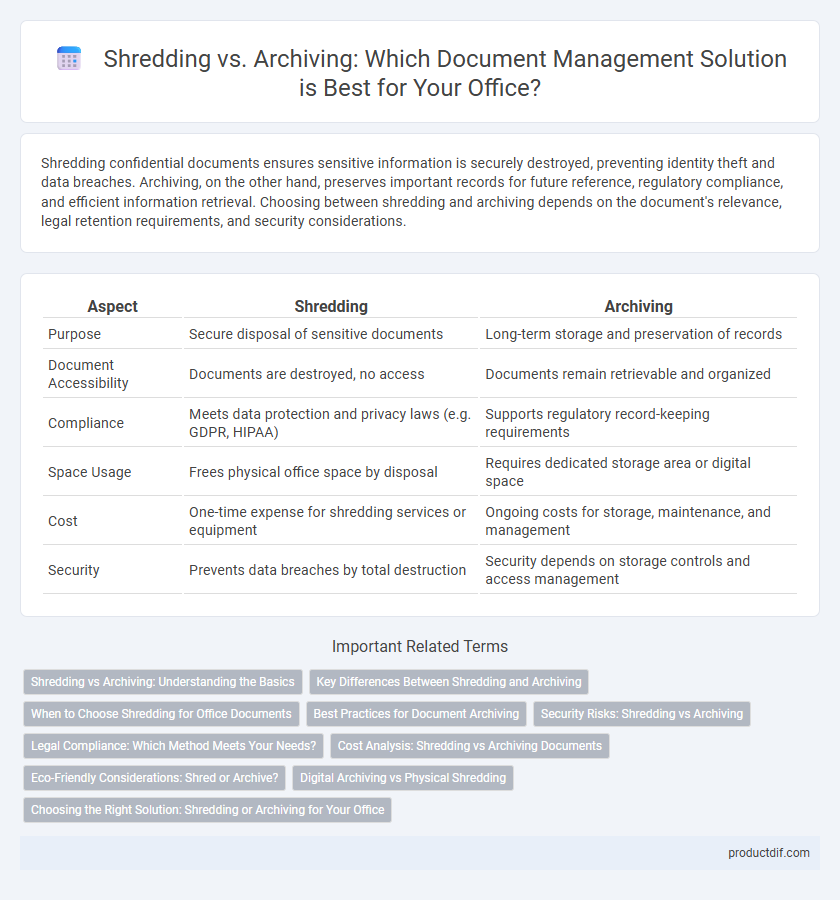Shredding confidential documents ensures sensitive information is securely destroyed, preventing identity theft and data breaches. Archiving, on the other hand, preserves important records for future reference, regulatory compliance, and efficient information retrieval. Choosing between shredding and archiving depends on the document's relevance, legal retention requirements, and security considerations.
Table of Comparison
| Aspect | Shredding | Archiving |
|---|---|---|
| Purpose | Secure disposal of sensitive documents | Long-term storage and preservation of records |
| Document Accessibility | Documents are destroyed, no access | Documents remain retrievable and organized |
| Compliance | Meets data protection and privacy laws (e.g. GDPR, HIPAA) | Supports regulatory record-keeping requirements |
| Space Usage | Frees physical office space by disposal | Requires dedicated storage area or digital space |
| Cost | One-time expense for shredding services or equipment | Ongoing costs for storage, maintenance, and management |
| Security | Prevents data breaches by total destruction | Security depends on storage controls and access management |
Shredding vs Archiving: Understanding the Basics
Shredding involves the secure destruction of sensitive documents to prevent data breaches, making it essential for complying with privacy regulations like GDPR and HIPAA. Archiving, on the other hand, focuses on systematic storage and preservation of records for easy retrieval and long-term reference, supporting efficient office management and legal compliance. Choosing between shredding and archiving depends on the document's confidentiality, retention requirements, and organizational policies.
Key Differences Between Shredding and Archiving
Shredding involves the irreversible destruction of sensitive documents to prevent unauthorized access, ensuring data security and compliance with privacy regulations. Archiving, in contrast, focuses on long-term preservation and organized storage of records for future reference, legal compliance, and business continuity. Key differences include destruction versus retention, temporary versus permanent use, and security versus accessibility priorities.
When to Choose Shredding for Office Documents
Choose shredding for office documents containing sensitive information such as personal data, financial records, or confidential client details to prevent identity theft and ensure data security. Shredding is essential when documents are no longer needed for legal or business purposes and must be permanently destroyed to comply with privacy regulations like GDPR or HIPAA. Opt for shredding when storage space is limited and eliminating risk outweighs the value of retaining physical copies.
Best Practices for Document Archiving
Effective document archiving involves categorizing files based on retrieval frequency and legal significance, ensuring secure storage solutions such as fireproof cabinets or cloud-based systems optimized for long-term preservation. Maintaining a consistent indexing system with metadata enhances searchability and compliance with data retention policies, reducing risks associated with data loss or unauthorized access. Regular audits and updates to the archive help verify document integrity, streamline office workflow, and support regulatory requirements for business records management.
Security Risks: Shredding vs Archiving
Shredding documents eliminates sensitive information permanently, reducing the risk of data breaches by preventing unauthorized access to confidential materials. Archiving stores records securely for long-term retention but requires robust access controls and encryption to mitigate security risks from potential cyberattacks or physical theft. Balancing shredding and archiving strategies is critical for maintaining compliance with data protection regulations while safeguarding organizational information.
Legal Compliance: Which Method Meets Your Needs?
Shredding ensures legal compliance by securely destroying confidential documents, preventing unauthorized access and data breaches in accordance with regulations like GDPR and HIPAA. Archiving meets compliance requirements by preserving important records in an organized, retrievable format that supports audit trails and long-term retention mandates. Choosing between shredding and archiving depends on whether retention or destruction of documents best aligns with your industry's legal obligations and data governance policies.
Cost Analysis: Shredding vs Archiving Documents
Shredding documents often incurs lower upfront costs due to minimal storage requirements but can lead to ongoing expenses for secure disposal services and potential data recovery gaps. Archiving, while involving higher initial investment for organized storage solutions like digital databases or physical filing systems, reduces long-term costs by enabling efficient information retrieval and regulatory compliance. A thorough cost analysis balances immediate shredding expenses against the strategic value and maintenance costs of systematic archiving.
Eco-Friendly Considerations: Shred or Archive?
Choosing between shredding and archiving office documents significantly impacts environmental sustainability, with shredding contributing to paper waste that requires energy-intensive recycling processes. Archiving digital copies reduces physical storage needs and conserves resources, promoting eco-friendly office management. Implementing efficient digital archiving systems coupled with responsible shredding of sensitive material supports both confidentiality and environmental goals.
Digital Archiving vs Physical Shredding
Digital archiving preserves documents in secure, searchable databases, enabling quick retrieval and long-term storage without physical space constraints. Physical shredding ensures sensitive information is permanently destroyed, preventing unauthorized access and data breaches. Choosing between digital archiving and physical shredding depends on compliance requirements, data sensitivity, and organizational efficiency goals.
Choosing the Right Solution: Shredding or Archiving for Your Office
Choosing the right office solution involves evaluating document sensitivity and retention requirements; shredding ensures secure disposal of confidential files while archiving preserves important records for future access and compliance. Implementing a tailored strategy minimizes clutter and reduces legal risks by balancing data protection with organized storage. Prioritize digital archiving systems and certified shredding services to enhance efficiency and maintain regulatory standards.
Shredding vs Archiving Infographic

 productdif.com
productdif.com